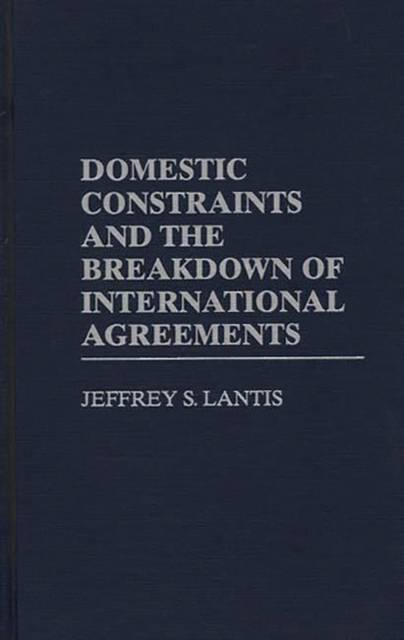
- Afhalen na 1 uur in een winkel met voorraad
- Gratis thuislevering in België vanaf € 30
- Ruim aanbod met 7 miljoen producten
- Afhalen na 1 uur in een winkel met voorraad
- Gratis thuislevering in België vanaf € 30
- Ruim aanbod met 7 miljoen producten
Domestic Constraints and the Breakdown of International Agreements
Jeffrey S LantisOmschrijving
This book explores how elite commitments to cooperate with international organizations can be supplanted by domestic political constraints. It contends that the most popular explanation for defections from international commitments in the foreign policy analysis literature, the two-level game model presented by Robert Putnam, does not fully account for surprising defections from agreements. A new framework is presented which interprets international defections as the product of domestic constraints on foreign policy-making that often materialize in the post-commitment ratification process, the period when domestic conditions and actors align relative to an international agreement.
To explore the dynamics of post-commitment politics, eight cases studies of the foreign policy decision-making process in the Federal Republic of Germany relative to commitments to the European Community and NATO in the 1970s and 1980s are presented. A comparative analysis of the cases demonstrates the importance of modifying the two-level game model to account for the sequential and complex nature of the ratification process in the post-commitment phase. The study concludes that factionalism in the major party government and inter-party coalition differences are primary, but often hidden, constraints on a leader's ability to uphold international agreements, and it shows how international commitments can awaken dormant domestic constituencies along the road to ratification. This is a work of great significance to scholars and researchers in the areas of foreign policy analysis, international organizations, and German politics.Specificaties
Betrokkenen
- Auteur(s):
- Uitgeverij:
Inhoud
- Aantal bladzijden:
- 256
- Taal:
- Engels
Eigenschappen
- Productcode (EAN):
- 9780275959487
- Verschijningsdatum:
- 28/10/1997
- Uitvoering:
- Hardcover
- Formaat:
- Genaaid
- Afmetingen:
- 152 mm x 229 mm
- Gewicht:
- 544 g

Alleen bij Standaard Boekhandel
Beoordelingen
We publiceren alleen reviews die voldoen aan de voorwaarden voor reviews. Bekijk onze voorwaarden voor reviews.











